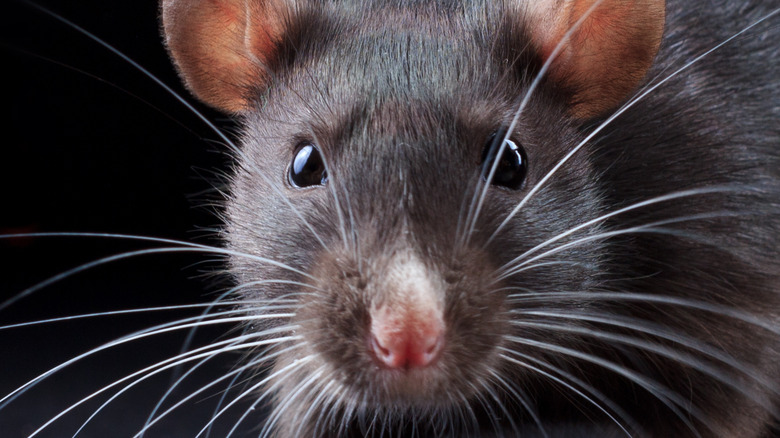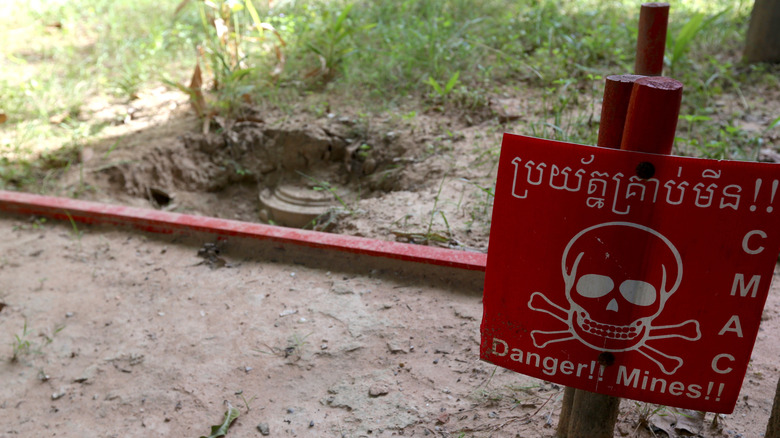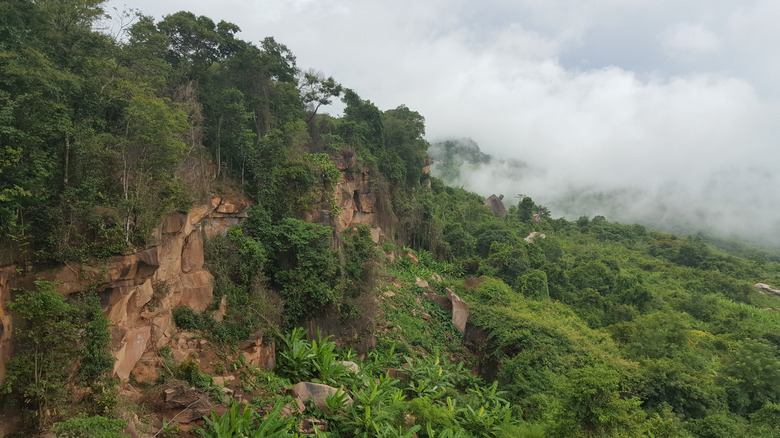The Strange Tale Of The Mine-Detecting Rat Who Won A Gold Medal
In September 2020, Magawa the HeroRAT (his actual job title) was awarded a gold medal for saving dozens of lives in Cambodia, as reported by Tanzanian-based charity APOPO. This rodent — an African giant pouched rat about the size of a chihuahua — detected more than 71 landmines and 38 other unexploded ordnances buried across the countryside over five years. With a super sense of smell, a weight light enough to avoid triggering active mines, and a potently trainable intelligence, Magawa was strapped to a harness and let loose to sniff out what would eventually be over 141,000 square meters of land, per the People's Dispensary for Sick Animals. And what did he get once he scratched an area of land to signal that he'd found a mine? A banana, as NPR explains.
PDSA — a U.K.-based veterinarian pet charity — has given out 30 awards to animals for life-saving work such as protecting families from armed intruders, rescuing children from fires, or aiding the police in the aftermath of terrorist attacks. With the exception of Magawa, all of them have been dogs. But APOPO, the organization that trains rats like Magawa, has schooled rats and dogs for over 20 years to detect not only mines but illnesses such as tuberculosis. Magawa, in particular, achieved superstar status, more than earning the tiny gold medal that straps to his harness.
The Khmer Rouge dictatorship left behind millions of landmines
Why does a rat need to detect landmines at all, you ask? To answer that, we've got to turn away from diminutive, adorable mammals and look to the hells of human military action.
Back in the 1960s, while the Viet Cong of Ho Chi Minh pushed southward in the neighboring country of Vietnam amid the war, political unrest also stirred in Cambodia, BBC reports. A jungle-based, militant wing of the Communist Party of Kampuchea, Khmer Rouge rose to power when another right-wing group deposed the nation's head of state, Prince Norodom Sihanouk, in 1970. A few years later, in 1975, Khmer Rouge took over the nation's capital Phnom Penh, as well as the country.
Pol Pot, leader of the Khmer Rouge, was inspired by China's ruling party and the possibility of a minimalist lifestyle "untainted" by Buddhism. In a vie to build an agrarian utopia, he arrested, tortured, and executed hundreds of thousands of people perceived as intellectuals, banished more to the countryside, abolished private property, and planted millions of landmines across the country.
An area of Cambodia's western border known as the K5 belt still tops the worldwide list of regions with the highest landmine densities. According to The Conversation, the 1,046-kilometer (650-mile) strip of land is festooned with nearly 2,400 mines per kilometer.
Pol Pot's reign lasted only four years until 1979, but he scarred the soul of Cambodia forever, as outlined in the Tuol Sleng Genocide Museum.
1997's UN Mine Ban Treaty started the healing process
As Voice of America reports, the United Nations Development Program claims that 4,320 people in Cambodia were killed or wounded by landmines and other unexploded ordnance in 1996 — violence from a conflict already dead for almost 20 years. In 1997, the United Nations passed its "Convention on the Prohibition of the Use, Stockpiling, Production and Transfer of Anti-Personnel Mines and on their Destruction," informally known as the "Ottawa Convention" or the "Anti-Personnel Mine Ban Treaty," per the United Nations Office for Disarmament Affairs. In 2019, after years of tireless mine-sniffing and disarmament, the number of individuals killed or wounded by landmines in Cambodia dropped to 77. And in a long-awaited turn for the better, the country is expected to be landmine-free by 2025.
Rats like Magawa played a hand in not only locating mines but rehabilitating Cambodia's psyche into something approaching peace of mind, per The Conversation. Christopher Cox, CEO and co-founder of APOPO, said on NPR, "We really trust our rats, because very often after clearing a minefield, our teams will play a game of soccer on the cleared field to assure the quality of our work." Elsewhere, Magawa's handler Malen said on the BBC, "He is small but he has helped save many lives allowing us to return much-needed safe land back to our people as quickly and cost-effectively as possible." Before retiring to a life of play and rest, Magawa will have a hand in training a new generation of rats.


